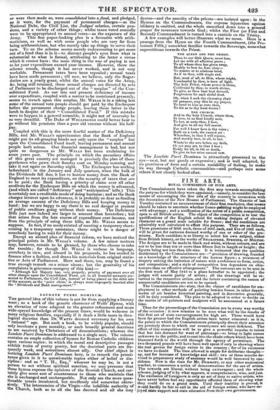LAUDATE PUENI DOMINUM.
THE general idea of this volume is not far from supplying a literary want ; as a book of the generic character of Watts' Hymns, with an elevation of tone adapted to the greater refinement and more wide-spread knowledge of the present times would be welcome in many religious families, especially if it dealt a little more in theo- logical doctrine than Dr. WATTS deemed necessary for his own " rational " age. But such a book, to be widely popular, should only inculcate a pure morality, or such broadly general doctrines as are received by Christians of all denominations; whereas the Laudate Pueri Dominum is addressed to a single sect. The volume contains an ample collection of hymns for Roman Catholic children upon various topics ; in which the moral and descriptive passages exhibit traits of pretty poetry, but the doctrinal parts are fre- quently weak, and sometimes almost silly. Our chief object in noticing Laudate Pueri Dotninum here, is to remark the promi- nence given in it to questionable topics either of belief or dis- cipline: and as "T. H., Esq.," whoever be may be, is not a person to act without spiritual sanction, we may presume that these hymns express the opinions of the Romish Church, and cer- tainly give some sort of countenance to those who maintain that she is unchanged and unchangeable. Not only are the more ques- tionable tenets inculcated, but needlessly and somewhat obtru- sively. The intercession of the Virgin—the infallible authority of the Church, both as to all she has decreed and all she may
decree—and the sanctity of the priests—are insisted upon : in the Hymns on the Commandments, the express injunction against idolatry is omitted, and the whole smoothed down into a general prayer for reverence towards God ; whilst the First (or First and Second) Commandment is turned into a canticle on the Trinity. A few examples will better illustrate what we mean. Here is a passage from the Hymn on the Fourth Commandment, (the Pro- testant Fifth,) somewhat familiar towards the Sovereign, somewhat superstitious towards the Priest.
me QUEEN AND THE PRIEST.
Thus, to our /ink Queen, sweet love, Let me with all affection prove ; To all whom thou has given sway, Meekly to bow to, fear, obey—
To master or to mistress bend, As if to thee, with single end.
But, most of all. to Him, whose might, Vouchsafed by thee, is born of light,
Thy holy Priest, whose power is thine, Confirmed by thee, in worth divine, To give, as thou hut hest decreed, Forgiveness for each sinful deed.
Oh, when I seek the cleansing chair Of penance, may this be my prayer,
To bend to him as unto thee, To his as to thy least decree
THE CHURCH.
And in thy holy Church, whom thou,
In love, to us hest kindly sent, To her, as unto thee, I bow, And give to all my full assent.
For well I know hers is thy voice ; Built on a rock, she cannot err : Wherefore, in thee I will rejoice, And meekly bow, in all, to her.
Whate'er she sets before my faith, Or yet may set, to that I bow ; Ready for all, in life or death, To give to her mine earnest vow.
The Laudate Pueri Dominant is attractively presented to the eye—neat, but not gaudy or expensive ; and is well adapted, by its prettiness of form and a certain amiability of feeling, to make
its way through Catholic communities—and perhaps into some others if not closely looked after.


























 Previous page
Previous page